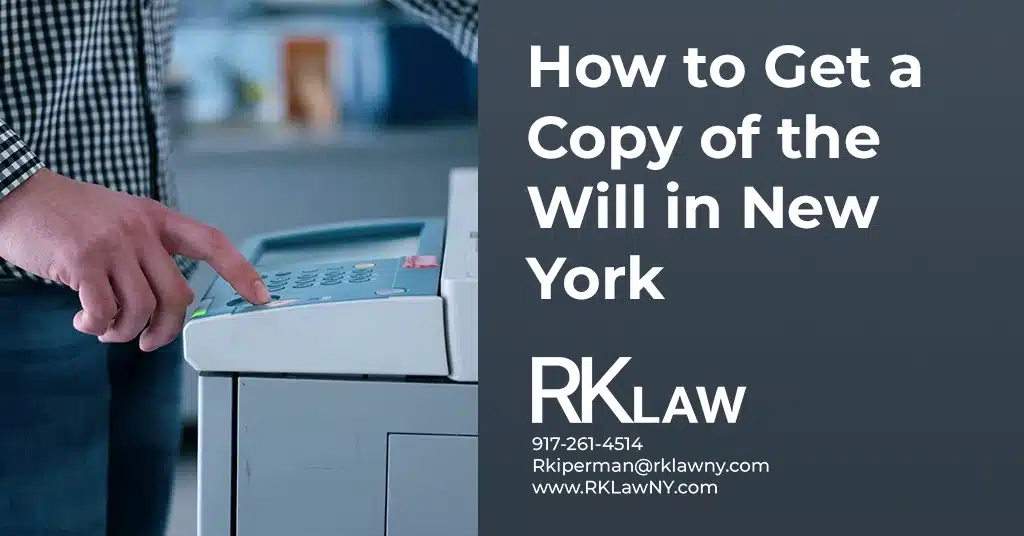If you are in New York and need to obtain a copy of a deceased person’s Last Will and Testament, it is crucial to understand the process and requirements involved. This blog post will walk you through the steps to get a copy of the Will in New York.
Step 1: Determine Your Eligibility To Get A Copy of the Will
Before you can request a copy of the Will in New York, you need to determine if you are eligible to do so. Only certain individuals have the legal right to obtain a copy of the Will. These typically include:
- Beneficiaries: If you are named as a beneficiary in the will, you have the right to obtain a copy.
- Executors: If you are named as the executor of the will, you have the right to access and obtain a copy.
- Heirs-at-law or Distributees: If you would inherit from the deceased person if there was no will, you may have the right to obtain a copy.
Step 2: Request a Copy of the Will from the Person you Believe to Be in Possession
This can be as simple as writing the person a letter. The letter can just state who you are. The letter should also state why are entitled to a copy of the Will, and what you are looking for.
Step 3: Draft and File the Petition to Get A Copy of the Will
If after you have sent the letter asking for a copy of the Will, you do not get a response, then you can file a petition with the Surrogate’s Court to get a Copy of the Will. This process is known as “Compelling Production of a Will pursuant to SCPA 1401.”
An estate litigation attorney can assist you in drafting a petition to compel the production of the Will. This petition must include essential information such as:
- The full name of the deceased person.
- The date of death.
- The specific reasons for compelling the will’s production.
- The names of the individuals or entities holding the will (often referred to as the “respondents”).
Step 4: File the Petition with the Surrogate’s Court
Your attorney will file the petition. Your attorney will also file the Order to Attend, with the appropriate Surrogate’s Court in the county where the deceased person resided at the time of their death. It’s essential to adhere to the court’s filing procedures and deadlines.
Step 5: Serve Notice to Person in Possession of the Will
Once the petition is filed, your attorney will ensure that the respondents are properly served. If the respondent is in New York, then they get an Order to Attend. If the Respondent is outside of New York, then they will get a Citation. This notifies them of the legal action and gives them an opportunity to respond.
Step 6: Court Proceedings to Get a Copy of the Will
After receiving notice, the respondents may choose to contest the petition or comply with the Court’s order to produce the Will. The Court will hold hearings or proceedings to resolve any disputes and ultimately determine whether the will should be produced.
Conclusion:
Compelling the production of a will in New York under SCPA 1401 is a legally rigorous process that should be undertaken with careful consideration and the guidance of an attorney.
It is often used in situations where the existence of a Will is in question or when individuals are not willingly providing access to the will.
If you find yourself in such a situation, consulting with an attorney who specializes in estate and probate matters is essential to navigate the process effectively.
For more information, please contact NYC Probate Litigation, Guardianship, NYC Probate and Estate Planning attorney Regina Kiperman:
Phone: 917-261-4514
Fax: 929-556-2089
Email: rkiperman@rklawny.com
Or visit her at:
40 Wall Street
Suite 2508
New York, NY 10005
Visit Regina on LinkedIn
Visit Regina on Facebook
This page is made available by the lawyer for educational purposes only as well as to give you general information and a general understanding of the law, not to provide specific legal advice. By using this site you understand that there is no attorney client relationship between you and the lawyer. The post should not be used as a substitute for competent legal advice from a licensed professional attorney in your state. ATTORNEY ADVERTISING.
